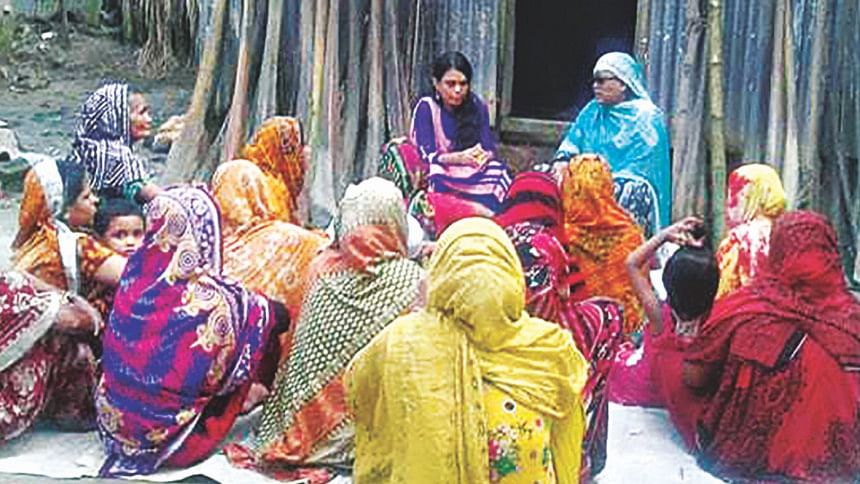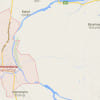Fighting back

Mosammat Peara Begum has been living with vivid memories of the acid attack on her for her refusal to engage in an extra marital affair, as if it happened only yesterday.
It was on December 17, 1998. The muazzin's call to the evening prayer could be heard in the distance when her eldest son's private tutor, Rakib Uddin, of the nearby Barigaon village, approached her house. Little did she know what was about to befall her.
Rakib, whom she had recently asked to discontinue the private tuition after he professed his love for her, flung open the door and threw acid at her. Some of the liquid splashed on her youngest son Awlad Hossain, next to her.
“At first, I felt a burning sensation on my face like my skin was peeling off. I then screamed like never before and lost consciousness,” recalls 45-year-old Peara.
Neighbours ran to call her husband and took her to Kapasia Health Complex. Doctors there referred her to Dhaka Medical College Hospital that advised them to take her to the Acid Survivors Foundation in Mirpur.
“It was no less than a miracle that the doctors were able to save my life and vision,” said Peara who underwent 22 surgeries over a period of eight months.
The physicians could not perform all the treatment procedures at a time as there were multiple infections needed to heal first.
“It was a long and emotionally taxing journey for me,” says Peara who keeps sunglasses on for most part of the day to avoid unwanted stares.
Her youngest son with minor burns received treatment for a month.
Peara's husband Afaz Uddin filed an FIR with Kapasia Police Station the day after the attack.
The accused appeared at the court within a week and the court put him in jail custody. As the trial ended, the court sentenced Rakib to death. Following his appeal against the verdict, the High Court commuted the punishment to 15 years in jail.
The village elders arranged an arbitration to settle the matter out of court, but Afaz did not agree.
“Acid Survivors Foundation came forward to bear all the expenses for my wife and son's treatment,” he says.
Ever since, Peara kept in touch with the foundation for counselling and training. As she regained strength, she formed Swanirvar Mohila Unnayan Sangstha (organisation for making women self-reliant) in 2009 with 121 members to support other acid attack survivors in Manikganj, Gazipur, Mymensingh and Narsingdi.
At present, there are 35 active members of this association who meet regularly to discuss how to prevent future attacks, give primary medical and judicial assistance to victims, and help them access funds to earn a livelihood.
Rezaur Rahman Laskar Mithu, vice chairman of Kapasia upazila parishad, says that when a group of repressed people unite and protest, it turns into a type of revolution.
Nasrin Akhter, Kapasia upazila women and children affairs officer, says the victims hold monthly meetings at their temporary office at Gosairgaon in Raniganj union of the upazila, where they outline various ways to become self-reliant. The Directorate of Women Affairs helps the female acid victims with strategic advice and grants.
Pankhi Rani, wife of Nimai Chandra Sutradhar, of Dakhhingaon village in Kapasia upazila, also had an acid attack on her on June 4, 2006 in front of her house over land dispute.
Neighbours Molin Chandra Sutradhar and Sokomol Sutradhar, sons of Suresh Chandra Sutradhar, had enmity with the family over land ownership. On the fateful day, they threw acid on her, leaving the skin of one side of her face peeled off and parts of her body deformed.
The attackers were sentenced to 10 years in jail. However, having been granted bail, they returned to beat her up twice.
It was then that members of the association came forward to help her. “I got support from them in terms of filing reports and other legal aid,” she says.
Moni Akhter, an acid burn victim who receives support from the organisation, says the acid survivors also get government grants.
“Some of us got sewing machines, others, access to education and guidance on how to take legal measures for social security,” she says. Her perpetrator was sentenced to 30 years in jail.
On blistering hot, humid days, her burnt, shrivelled skin still itches. Peara says only a victim of an acid attack will be able to feel the pain of another victim.
She has devoted her life to helping other acid victims and is now an inspiration to both men and women in her locality.

 For all latest news, follow The Daily Star's Google News channel.
For all latest news, follow The Daily Star's Google News channel. 






Comments